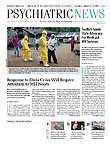Link Found Between PTSD, Food Addiction
Previous research has suggested that posttraumatic stress disorder (PTSD) is a risk factor for obesity. A recent study published in JAMA Psychiatry may be able to explain the reasoning behind this hypothesis.
Researchers at the University of Minnesota, Minneapolis, analyzed data on nearly 50,000 women to assess the association between trauma exposure, PTSD symptoms, and food addiction. Food addiction was defined by three or more symptoms that included eating when no longer hungry four or more times a week and feeling the need to eat an increasing amount of food to reduce distress.
Of the women who experienced traumatic events and reported six to seven PTSD-associated symptom episodes, food addiction was prevalent at a rate of 18 percent, compared with 8 percent in traumatized women reporting no PTSD-associated symptoms. Earlier onset of symptoms predicted a higher prevalence of food addiction. Symptoms of PTSD in response to physical abuse in childhood had the strongest association with such addiction.
The researchers concluded that their findings “provide support for hypotheses suggesting that the association between PTSD and obesity might partly originate in maladaptive coping and use of food to blunt trauma-associated distress.”
Poor Sleep Increases Risk For Suicide in Older Adults
A study published in JAMA Psychiatry shows that older adults with sleep disturbances may be more likely to die by suicide than their well-rested counterparts.
Researchers from the Suicide Prevention Research Laboratory at Stanford University School of Medicine led a study examining the relationship between sleep quality and risk of suicide in 420 individuals aged 65 and older.
They found that participants who reported having poor sleep habits within a 10-year period before the survey had a 1.4 times greater chance of death by suicide than those reporting sleeping well. When comparing the effects of poor sleep quality on suicide risk with that of depression, an independent risk factor for suicide, the researchers observed that poor sleep predicted a greater risk for suicide than for depression. The combination of poor sleep and depressed mood was the strongest predictor of suicide risk.
“Our findings suggest that poor sleep quality may serve as a stand-alone risk factor for late-life suicide,” said Rebecca Bernert, Ph.D., lead author of the study and an instructor in psychiatry at Stanford.
The researchers concluded that because sleep disturbances are highly treatable, these findings highlight the importance of sleep quality as a screening tool for suicide and a potential treatment target in suicide prevention.
Study Links Iron Deficiency In Pregnancy to Autism
Mothers of children with autism spectrum disorder (ASD) are less likely to report having taken iron supplements before and during their pregnancies than mothers of children without the disorder, according to a study in the American Journal of Epidemiology.
Researchers from the MIND Institute at the University of California, Davis, conducted a study involving more than 850 mother-child pairs to examine the relationship between iron intake and having a child with ASD. Data were collected on the mothers’ source of iron derived from vitamins, other nutritional supplements, and breakfast cereal from the three months prior to pregnancy to the end of breastfeeding.
The analysis showed that low iron intake was associated with a fivefold greater risk of ASD in children whose mother was aged 35 or older during pregnancy or suffered from a metabolic condition such as obesity, hypertension, or diabetes.
“Iron deficiency, and its resultant anemia, is the most common nutrient deficiency, especially during pregnancy, affecting 40 to 50 percent of women and their infants,” commented Rebecca Schmidt, D.O., lead author and molecular epidemiologist. “Iron is crucial to early brain development, contributing to neurotransmitter production, myelination, and immune function. All three of these pathways have been associated with autism.” Schmidt said that until the study has been replicated, women should continue to follow doctors’ instructions on taking vitamins throughout pregnancy at the recommended daily dosage.
Antipsychotics May Increase Risk for Diabetes in Youth
A group of clinician scientists from Aalborg University Hospital in Denmark analyzed data of approximately 50,000 children and adolescents with psychiatric disorders to examine the frequency and possible predictors of type 2 diabetes among this population.
While the study found no correlation between psychiatric diagnosis and diabetes development, it did find that youth who had been exposed to antipsychotic medication were three times more likely to develop diabetes than unexposed youth.
Though the researchers noted that the use of antipsychotic drug treatment can be necessary for some of the psychiatric disorders diagnosed in children and adolescents, they emphasized that the current data raise a concern about the frequent use of antipsychotics for nonpsychotic disorders and off-label conditions, such as disruptive behavior disorders, which should first be treated with nonpharmacologic management options.
The researchers concluded that it is critically important for physicians to follow “current guidelines that [suggest that] antipsychotics should be used in children and adolescents only when other evidence-based and safer treatment options have been exhausted.” ■

